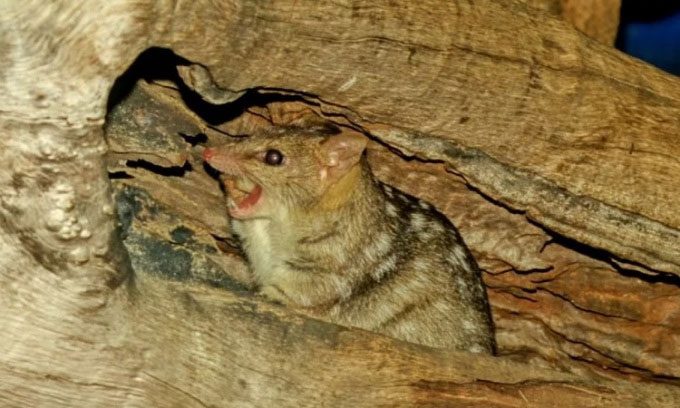The male northern quokka has a lifespan of about one year due to the demands of mating and reproduction, as it does not rest while searching for mates.
The male northern quokka prioritizes mating over sleeping, which can result in them dying four times faster than their female counterparts, according to a study from the University of Sunshine Coast in Australia and the University of Queensland published in the journal Royal Society Open Science on February 1. It seems that this drive is strong enough that they forego sleep to spend more time searching for mates, said environmental physiologist Christofer Clemente from the University of Sunshine Coast, a co-author of the study.

Quokka on a tree trunk. (Photo: iStock).
The northern quokka is a critically endangered marsupial about the size of a domestic cat. They are the smallest among the four species of quokkas in Australia, with a maximum body length of about 38 cm. Their famous relatives include kangaroos, koalas, and numbat marsupials. The population of this species has been declining in recent decades due to various factors, including feral cats, dingo and fox predation, habitat destruction from bushfires and land clearing for livestock, and poisoning from invasive cane toads. Female northern quokkas can live up to four years, while males typically live only up to one year.
Over 42 days, the research team collected data on the movement of quokkas on Groote Eylandt, an island off the coast of the Northern Territory, Australia. They found that males spent less time sleeping than females and traveled longer distances. Some male quokkas traveled up to 10.5 km in one night in search of mates. Adjusted for stride length, this distance is equivalent to about 40 km per night for a human. According to the lead researcher Joshua Gaschk from the University of Sunshine Coast, two male quokkas named Moimoi and Cayless traveled 10.4 km and 9.4 km respectively in a single night.
The researchers also noted that males only spend 7% of their time resting, while females spend 24% of their time resting. Due to lack of sleep, they often lose weight, become more aggressive, take greater risks, and are more susceptible to parasitic infections. However, the exact reasons why male quokkas die early remain unclear. The research team could not identify any movement syndrome that leads to higher mortality rates in male quokkas compared to females. They suspect that the primary cause behind their short lifespan is sleep deprivation.
Quokkas are the largest mammals that use a single reproductive event strategy, investing all their energy into one breeding season. Researchers have noted similar behavior in Pacific salmon, certain squid and octopus species, butterflies, grasshoppers, and plankton. In mammals, similar behavior has been observed in members of the Dasyuridae family and opossums. Despite the endangered status of the quokka, the research team has not identified any measures to slow down the population decline stemming from their reproductive behavior.


















































